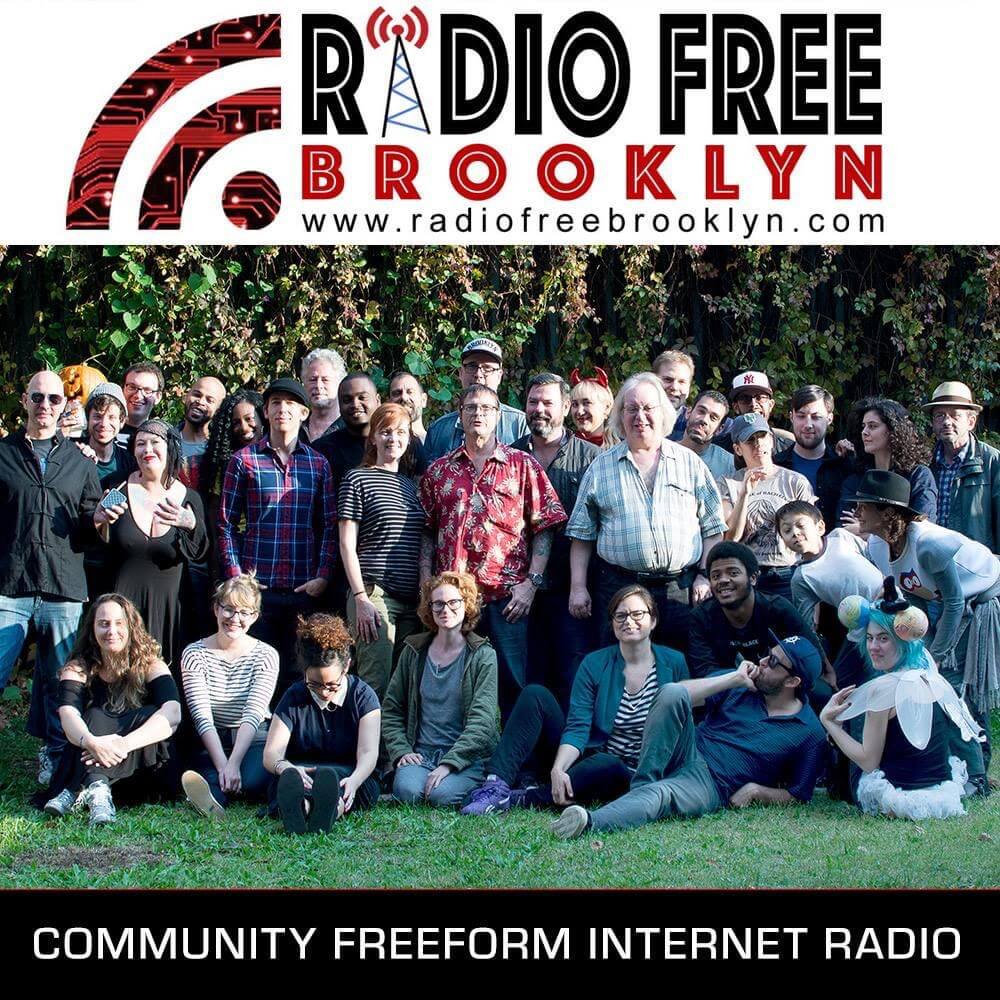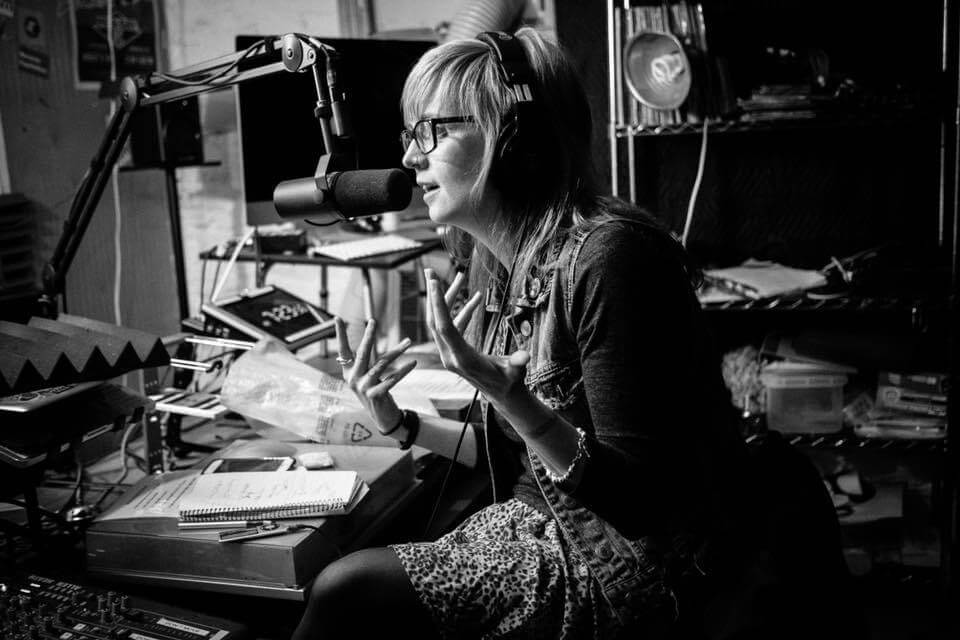For Rachel Cleary, the dream of starting a radio station came about while in repose on her living room sofa. She was initially inspired by her desire to translate her experiences at open mics to radio. She recalls discussing the idea with her partner Robert Prichard and friend Tom Tenney.
“We knew a physical location was too expensive. They got the idea to do an internet station and realized they could buy a domain name for $8.00. It built fast, I jumped in, and we launched in May 2015,” Cleary says.
Prichard owns a production company called Surf Reality and has produced a number of live events and theatrical series, including Radical Vaudeville and the KGB Show. He is best known as the former proprietor of Surf Reality’s House of Urban Savages, which was a black box theater on the Lower East Side that ran from 1993-2003. Tenney has produced the Mixed Media Festival, a number of shows including Grindhouse-A-Go-Go, and he also managed a brick and mortar theater called “Space.”
Previously, Cleary had done stage work and voice overs but had never worked in radio. She started filling in on special projects and management roles. She enjoyed the work and launched her own show “Hear and Now with Rachel C”, which she has been producing and hosting since November 2015. Cleary is now the Musical Director of the station.
Eventually, the team rented a room below a bike shop in Brooklyn. Today, the station is located at 199 Cook Street in Bushwick. Cleary says the new space is nicer, well lit and climate controlled. It looks more professional “though musicians usually don’t care about the looks,” she quips. They are set up for band performances, though they’re still not holding live events due to Covid concerns.
In terms of Covid safety, Cleary says, “We have protocols. For example, we can’t have more than three people at once in the station. Though, unless they’re on the mic, artists don’t need a mask. I can also set up my own rules. We ask for documentation of vaccination for anyone entering the studio. Temperature checks will also be put into place. If not, I can meet artists outside. I don’t want to be a risk to anyone. If you’re unvaccinated, you’re at risk.”
She has adapted to the pandemic by interviewing many artists and bands via Zoom. “I was initially against it because I like the spontaneity that comes from meeting in person, but Covid changed that. Zoom has value because I can talk to people who couldn’t otherwise come into the studio. I’ve gotten to talk to people from all over the world. Covid forced me to think outside the box, and Zoom opened things up,” she adds.
The station uses several different programs including Dropbox, Megaseg, and AudioHijack for technical production. Cleary is able to work remotely via the use of a program called VNC Viewer, which allows her to login to the station’s functions remotely and see everything that’s happening. All broadcasts are archived and available for listening via the station’s website.
A management team handles the day-to-day station operations, and certain members are assigned a day of the week for which they are “on call”, meaning they are responsible for handling any incoming support tickets, urgent problems, and general queries from show hosts. “The team also has a Station Director and Programming Director, who function very much like chairs. It is very much a group effort,” Cleary explains.
Being internet only, the station is liberated from the usual confines of FCC rules. “We’re freeform, so hosts can do what they want within certain parameters. You can swear on our station, and a lot of people do, at least on my show,” she muses.
When asked if they’ve ever considered “getting on the dial”, Clearly says, “Hear and Now with Rachel C. is something I developed for Radio Free Brooklyn. I feel like it’s something that should stay there. The station is on the internet because it was an affordable option. Starting a terrestrial radio station wasn’t something that the co-founders had in the budget. This small project has snowballed, and I don’t know that it’s worth messing with a good thing. And people are very streaming-oriented now. They listen to their radio on the internet.”
As an organization, the station has achieved non-profit status and is supported by donors and staff contributions. “We operate on a cooperative model. Everyone who is a part of the community pays monthly dues, but they also have a voice in what happens. These dues, along with grants, tax-deductible donations from the public, and merchandise sales all fund the station. We also receive funding through various drives, like Facebook birthday fundraisers, and in-person events in the pre-pandemic days,” Cleary explains.
When asked what makes for a good show, Cleary pauses and says, “Knowing your subject and what they want to talk about is important. I want them to know that they’re respected and treated well. Our focus is their art. And though it is work, I always try to be welcoming and make it fun. I wouldn’t do it otherwise.”
After having been involved for seven years, Cleary continues to be inspired by the positive feedback she receives from former guests. “I enjoy finding out about new and local artists, and I play music that isn’t getting played elsewhere. People appreciate that. I had a friend who reminded me that radio is kind of a dying art form and that it’s important. That encouraged me,” she says.
credited to Lit Riot Press
Looking ahead, the station is seeking to cautiously welcome more in-studio programming. “We are accepting proposals for new shows and are looking to expand our talk programming. I am personally spearheading a benefit album project that will feature various musical artists with proceeds from the album going to Radio Free Brooklyn. I’d love to do more in-person interviews for my show, even if it’s interviews conducted outdoors with fully vaccinated guests. I’m back to doing a lot of Zoom interviews, and that’s getting a little tiresome,” she says.
The public can find out more by signing up for the monthly station newsletter, following the station on social media and listening to individual shows. Cleary adds, “We love hearing from listeners, we really do! I want people to know that Radio Free Brooklyn is a collaborative community. We work together on projects. I have been a guest on other people’s shows and vice versa. There is no way a 24-hour internet radio station, which no-one is paid to run, can possibly continue unless people care about it and come together to make sure it works. And that’s what’s happening here.”
For more information, go to: https://radiofreebrooklyn.com
• Mike Cobb is a writer, musician, and multimedia producer. Reach him at: https://www.mc-obb.com










